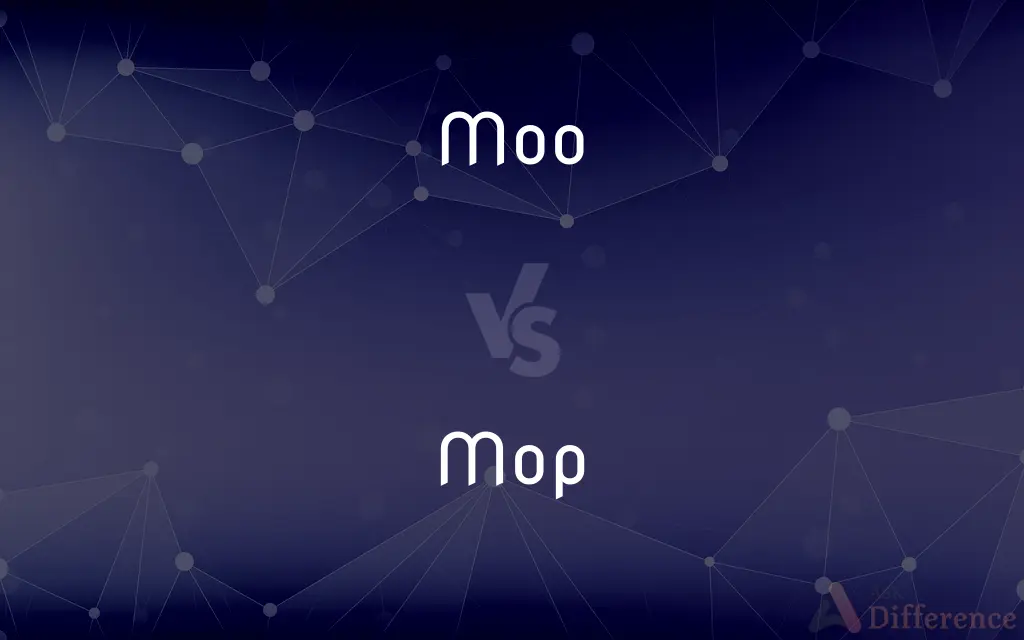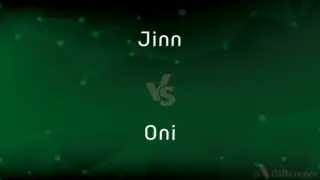Moo vs. Mop — What's the Difference?
By Urooj Arif & Maham Liaqat — Updated on April 17, 2024
Moo, the sound made by a cow, represents an onomatopoeic expression, whereas mop, a cleaning tool, signifies physical utility.

Difference Between Moo and Mop
Table of Contents
ADVERTISEMENT
Key Differences
Moo is an onomatopoeic word imitating the sound produced by cows, capturing the essence of vocal animal communication. Whereas, mop refers to a household cleaning tool typically consisting of a bundle of yarn or other absorbent material attached to a stick or handle.
Moo serves as a linguistic tool to teach children animal sounds, which can aid in their cognitive and language development. On the other hand, mop is used practically for maintaining cleanliness, contributing to hygiene and order in environments.
Moo has limited variations and is primarily associated with cattle, underscoring its role in animal sound recognition. Meanwhile, mop can vary in material, size, and type, such as sponge mops or string mops, catering to different cleaning needs.
Moo often appears in cultural media like children’s books and songs, reinforcing its educational and entertainment value. Conversely, mop is featured in instructional contexts related to cleaning techniques and products, emphasizing its functional utility.
Moo connects with rural and agricultural life, symbolizing pastoral scenes and farm animals. In contrast, mop is linked with domestic and commercial settings, symbolizing maintenance and labor.
ADVERTISEMENT
Comparison Chart
Definition
Sound made by cows
Cleaning tool
Usage
Animal communication
Cleaning surfaces
Variations
Few (mostly volume)
Many (material, type)
Context
Educational, entertainment
Practical, instructional
Symbolic Connection
Rural, pastoral life
Maintenance, labor
Compare with Definitions
Moo
Sound produced by a cow.
The cow said moo softly as the farmer approached.
Mop
A tool for cleaning floors.
She used the mop to scrub the dirty kitchen floor.
Moo
An onomatopoeic expression imitating bovine sounds.
The book used moo to describe the cow's call.
Mop
Consists of a handle and absorbent material.
He replaced the old mop head with a new one for better cleaning.
Moo
A playful term used in educational contexts.
The toddler enjoyed pressing the button to hear the moo sound.
Mop
Varieties include sponge, string, and flat mops.
For the wooden floors, use a microfiber flat mop.
Moo
A vocalization characteristic of bovines.
Children learn that cows moo, not bark.
Mop
Used in various cleaning contexts.
The janitor mopped the hallway every evening.
Moo
A common sound in rural and farm settings.
The peaceful morning was filled with the moo of distant cows.
Mop
Essential for household and commercial hygiene.
Every cleaning closet has a mop and bucket.
Moo
An object-oriented MUD.
Mop
A mop (such as a floor mop) is a mass or bundle of coarse strings or yarn, etc., or a piece of cloth, sponge or other absorbent material, attached to a pole or stick. It is used to soak up liquid, for cleaning floors and other surfaces, to mop up dust, or for other cleaning purposes.
Moo
The lowing of a cow or a similar sound.
Mop
A household implement made of absorbent material attached to a typically long handle and used for washing, dusting, or drying floors.
Moo
To emit the deep, bellowing sound made by a cow; low.
Mop
A loosely tangled bunch or mass
A mop of unruly hair.
Moo
(onomatopoeia) The characteristic lowing sound made by cattle.
Mop
To wash or wipe with or as if with a mop
Mopped the hallway.
Mopping the spilled water.
Mopped her forehead with a towel.
Moo
A foolish woman.
You silly moo! What did you do that for?
Mop
To use a mop to wash or dry surfaces
Mopped along the baseboards.
Moo
(intransitive) Of a cow or bull, to make its characteristic lowing sound.
Mop
An implement for washing floors or similar, made of a piece of cloth, or a collection of thrums, or coarse yarn, fastened to a handle.
Moo
The characteristic sound made by a cow or bull.
Mop
A wash with a mop; the act of mopping.
He gave the floor a quick mop to soak up the spilt juice.
Moo
See Mo.
Mop
(humorous) A dense head of hair.
He ran a comb through his mop and hurried out the door.
Moo
To make the noise of a cow; to low; - a child's word.
Mop
A fair where servants are hired.
Moo
The lowing of a cow.
Mop
The young of any animal.
Moo
The sound made by a cow or bull
Mop
A young girl; a moppet.
Moo
Make a low noise, characteristic of bovines
Mop
A made-up face; a grimace.
Mop
(transitive) To rub, scrub, clean or wipe with a mop, or as if with a mop.
To mop (or scrub) a floor
To mop one's face with a handkerchief
Mop
(intransitive) To make a wry expression with the mouth.
Mop
To shoplift.
Mop
A made-up face; a grimace.
Mop
An implement for washing floors, or the like, made of a piece of cloth, or a collection of thrums, or coarse yarn, fastened to a handle.
Mop
A fair where servants are hired.
Mop
The young of any animal; also, a young girl; a moppet.
Mop
To make a wry mouth.
Mop
To rub or wipe with a mop, or as with a mop; as, to mop a floor; to mop one's face with a handkerchief.
Mop
Cleaning implement consisting of absorbent material fastened to a handle; for cleaning floors
Mop
To wash or wipe with or as if with a mop;
Mop the hallway now
He mopped her forehead with a towel
Mop
Make a sad face and thrust out one's lower lip;
Mop and mow
The girl pouted
Common Curiosities
What is a mop?
A cleaning tool used to clean floors.
What is a moo?
It's the sound that a cow makes.
Can "moo" have different meanings?
Primarily, it relates to the sound made by cows, but it can also be used playfully in various contexts.
What are the different types of mops?
Common types include sponge mops, string mops, and flat mops.
How often should mops be replaced?
Depends on usage but generally when they become worn out or less effective.
How do you use a mop?
Typically involves dipping it into water or cleaning solution, wringing it out, and then using it to clean floors.
Why is knowing about mops important?
Understanding different mops can improve cleaning effectiveness and efficiency.
Can a mop be used on all floor types?
No, some mops are better suited for specific floor types like hardwood or tile.
How is moo used in language?
As an onomatopoeic term to mimic the sound of cows.
Why is the sound "moo" significant in teaching children?
It helps in animal recognition and sound association, key in early learning.
What materials are mops made from?
Materials vary but often include cotton, microfiber, and synthetic blends.
What cultural significance does the moo have?
It's often associated with pastoral and agricultural life.
Where are mops commonly used?
In homes, businesses, and anywhere with hard flooring.
Where might you hear a cow moo?
Typically in rural areas or on farms where cows are present.
How has the design of mops evolved?
From simple rag-on-stick models to advanced, ergonomic designs with various features.
Share Your Discovery

Previous Comparison
Jinn vs. Oni
Next Comparison
Euglena vs. ProtozoaAuthor Spotlight
Written by
Urooj ArifUrooj is a skilled content writer at Ask Difference, known for her exceptional ability to simplify complex topics into engaging and informative content. With a passion for research and a flair for clear, concise writing, she consistently delivers articles that resonate with our diverse audience.
Co-written by
Maham Liaqat













































